For dog owners, understanding what constitutes a safe diet for their furry companions is paramount. While many human foods can offer nutritional benefits and make for enjoyable treats, a surprising number of common household items pose significant health risks, ranging from mild discomfort to fatal poisoning. Each year, hundreds of thousands of pet poisonings occur in the United States, with everyday foods being a major contributor. Knowing what foods your dog should avoid is critical for preventing these dangerous incidents and ensuring your canine friend lives a healthy, happy life. This guide aims to provide clarity on the most dangerous foods for dogs, empowering you to keep your pet safe and sound. It’s a vital resource for every dog owner, offering a comprehensive understanding of what foods should you not feed a dog to ensure their well-being.
Dogs’ digestive systems and metabolisms differ significantly from humans, meaning their bodies process certain substances in unique ways. For instance, dogs metabolize compounds like theobromine and caffeine found in chocolate much slower than humans. This slower processing allows these substances to accumulate rapidly in their system, potentially leading to fatal consequences. Similarly, while you might enjoy cherries, the cyanide present in their pits, stems, and leaves can be problematic for dogs if consumed in large quantities. Even the pits themselves can cause gastrointestinal upset due to their indigestibility, making it safer to avoid them entirely. Food toxicity can also vary based on a dog’s size, breed, and existing health conditions, highlighting the importance of consulting your veterinarian with any concerns about your dog’s diet.
Why Some Human Foods Are Dangerous for Dogs
The physiological differences between dogs and humans are the primary reason why certain foods are toxic to our canine companions. A substance that is harmless or even beneficial to humans can be detrimental to dogs due to variations in enzyme activity, metabolic pathways, and organ sensitivities. This disparity means that dogs may not be able to break down certain compounds effectively, leading to a build-up of toxins in their system. Understanding these fundamental differences helps us appreciate why a seemingly innocent snack from our plate can be a serious threat to our pets. For a more detailed look at specific items, understanding what dogs can’t eat list is essential. what dogs can t eat list
Common Toxic Foods Your Dog Must Avoid
Many household foods pose significant dangers, and in some cases, can be toxic to dogs. While this is not an exhaustive list, it covers some of the most common and hazardous items your dog should never ingest.
Alcohol
Even minimal amounts of alcohol can have severe, potentially deadly effects on dogs due to their smaller size compared to humans. Symptoms of alcohol poisoning in dogs mimic those in people, including vomiting, breathing difficulties, coma, and even death.
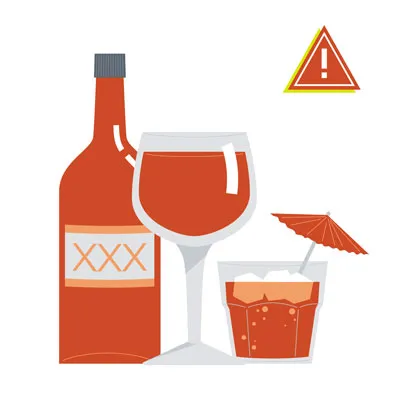 A close-up image of a glass of amber-colored alcohol, likely whiskey or brandy, sitting on a table.
A close-up image of a glass of amber-colored alcohol, likely whiskey or brandy, sitting on a table.
Fruit Seeds and Pits (Apples, Apricots, Cherries, Plums)
While the fleshy part of an apple is generally safe for dogs, the core and seeds contain cyanide and should be avoided. Similarly, the pits and seeds of apricots, cherries, peaches, and plums also contain cyanide, which can lead to severe symptoms like vomiting, irregular heartbeats, seizures, coma, and even death by impairing red blood cells’ ability to carry oxygen.
Avocado
Avocados are not a suitable food for dogs. While rare, there have been reported cases of myocardial damage in dogs after avocado consumption. More commonly, the large, intact pit of an avocado can cause a severe gastrointestinal obstruction if swallowed, necessitating immediate veterinary attention.
Broccoli
Broccoli contains isothiocyanates, which can be harmful to pets in very large quantities. While small, occasional amounts might be tolerated, it’s generally safer to avoid it, especially since many other healthy alternatives are available. Additionally, broccoli stalks can pose a choking hazard or cause an obstruction in a dog’s throat.
Caffeine and Coffee Grounds
Caffeine contains methylxanthines, which can cause life-threatening symptoms such as diarrhea, vomiting, seizures, and an irregular heartbeat in dogs. Even accidental ingestion of coffee grounds or highly caffeinated beverages can lead to a racing heart, tremors, arrhythmia, and difficulty breathing.
Fatty Meats and Bones (Chicken/Turkey Skin, Ham)
Fatty cuts of meat, including ham and poultry skin, are dangerous for dogs due to their high fat content. These can trigger acute pancreatitis, a severe and potentially fatal inflammatory condition of the pancreas. Furthermore, cooked bones, especially from chicken or turkey, can splinter, causing obstructions or puncturing the stomach or intestines, leading to life-threatening abdominal infections. To learn more about specific meat items, you should explore what is the one meat all dogs should avoid. what is the one meat all dogs should avoid
Chocolate
Chocolate toxicity is a frequent cause of pet poisoning. All chocolate products contain theobromine, a compound dogs cannot metabolize efficiently. The darker the chocolate, the higher the concentration of theobromine, making dark and baker’s chocolate particularly hazardous. Chocolate also contains caffeine, and some sugar-free varieties may include xylitol, an additional toxin. Symptoms of chocolate ingestion range from hyperactivity and vomiting to abnormal heart rhythms and seizures. Immediate veterinary attention is crucial if your dog consumes any amount of chocolate.
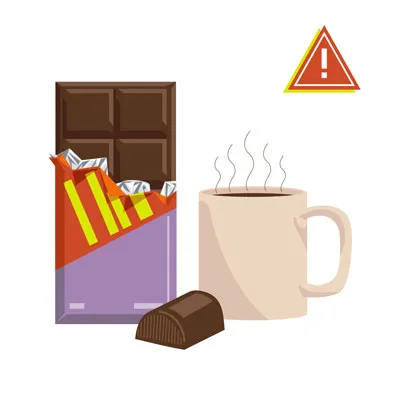 A bar of dark chocolate broken into squares, with some smaller chocolate pieces scattered around.
A bar of dark chocolate broken into squares, with some smaller chocolate pieces scattered around.
Grapes and Raisins
Grapes and raisins are highly toxic to dogs and can cause acute kidney failure. The exact mechanism of toxicity is still being researched, but the tartaric acid in these fruits is believed to be responsible. Even a small number of grapes or raisins can wreak havoc on a dog’s kidneys. Symptoms include vomiting, diarrhea, loss of appetite, and changes in urination (from increased to no urine production).
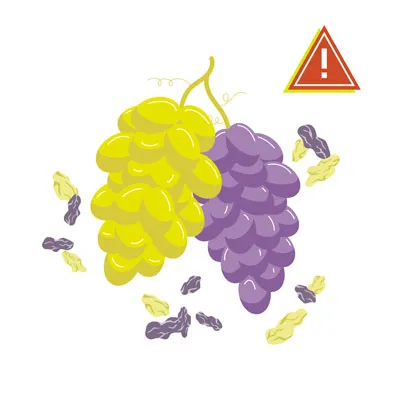 A bunch of red and green grapes on a wooden surface, with some loose grapes scattered.
A bunch of red and green grapes on a wooden surface, with some loose grapes scattered.
Macadamia Nuts, Almonds, and Pistachios
Macadamia nuts are particularly toxic to dogs, causing symptoms like weakness, overheating, and vomiting. As few as six nuts can lead to severe poisoning in a small dog. While the precise toxic mechanism is not fully understood, they are unequivocally dangerous. Other nuts like almonds and pistachios primarily pose choking hazards, especially if seasoned or spiced.
Milk and Dairy Products
The suitability of milk and dairy products for dogs is highly individualized. Many dogs are lactose intolerant and can experience diarrhea and gas from consuming cow’s milk. High-sugar and high-fat dairy items like ice cream are also unhealthy. Small quantities of lower-fat cheese can sometimes be given as a treat if your dog tolerates dairy well.
Mushrooms
It is safest to avoid feeding your dog any mushrooms. Wild mushrooms can contain a variety of toxins that may cause severe health issues, including kidney and liver failure, vomiting, diarrhea, hallucinations, and damage to red blood cells. Even store-bought white mushrooms, while potentially safer, are best replaced with other known safe treats to err on the side of caution.
Nutmeg and Cinnamon
Nutmeg contains myristicin, a compound that can induce hallucinations and severe vomiting in dogs, especially in high doses or smaller breeds. Cinnamon, while not strictly toxic, can irritate a dog’s mouth and, in larger amounts, may lead to dangerously low blood sugar. It’s best to keep both spices out of your dog’s diet.
Onions, Garlic, Chives, and Leeks
All plants belonging to the allium family—including onions, garlic, chives, and leeks—are highly toxic to dogs and cats. They contain sulfoxides and disulfides that can damage red blood cells, leading to potentially fatal anemia. These ingredients are often found in powders and prepared human foods, so always check labels. Certain Japanese breeds like Akitas and Shiba Inus are particularly sensitive, but all dogs are at risk.
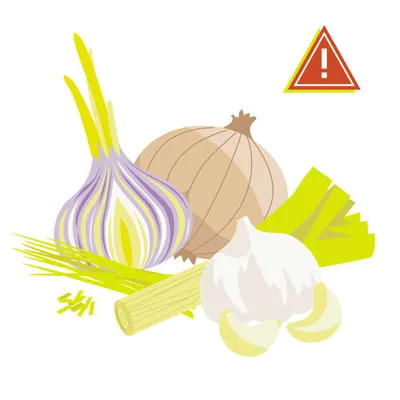 A cutting board with a red onion, garlic cloves, and fresh chives, indicating common kitchen ingredients.
A cutting board with a red onion, garlic cloves, and fresh chives, indicating common kitchen ingredients.
Salt
Excessive salt intake can disrupt the fluid balance in a dog’s cells, leading to tremors, seizures, diarrhea, or even a coma. This applies to salty snacks like potato chips, as well as non-food items containing high salt concentrations, such as rock salt or homemade play dough.
Spicy Food
Spicy foods can cause considerable discomfort and health issues for dogs, including vomiting, stomach ulcers, and diarrhea. Keeping your dog away from hot and spicy human meals is important for their gastrointestinal health.
Sugar-Free Gum and Candy (Xylitol)
Xylitol, an artificial sweetener commonly found in sugar-free gum, candy, and some baked goods, is extremely toxic to dogs. It causes a rapid and severe drop in blood sugar, leading to weakness, seizures, and potentially liver failure. The ingestion of xylitol is an increasing concern in pet poisoning cases, with even a small amount having fatal potential for a medium-sized dog.
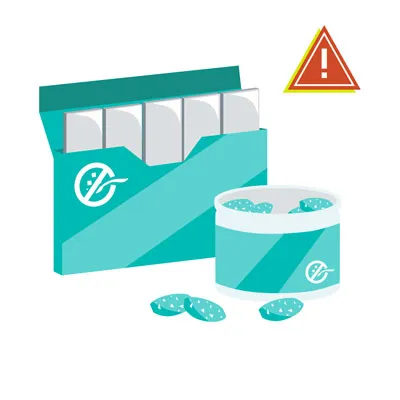 A close-up of various colorful sugar-free chewing gums and candies in their wrappers.
A close-up of various colorful sugar-free chewing gums and candies in their wrappers.
Tomatoes and Raw Potatoes
Ripe red tomatoes are generally safe, but the green parts of the tomato plant and unripe green tomatoes contain solanine, which is toxic to dogs. Similarly, cooked potatoes without additives are safe in small amounts, but raw potatoes also contain solanine and should not be fed to dogs.
Tobacco
Tobacco products, including cigarettes and cigarette butts, contain nicotine, which is highly dangerous for dogs. Exposure can lead to vomiting, diarrhea, rapid breathing, agitation, abnormal heart rate, wobbliness, seizures, and even coma. Immediate veterinary care is essential if your dog ingests tobacco. For a comprehensive guide, refer to a list of what dogs can’t eat. a list of what dogs cant eat
Yeast and Raw Dough
Raw yeast dough is unsafe for several reasons. It can expand in a dog’s stomach, causing severe pain, bloating, and potentially life-threatening gastric torsion or rupture. Additionally, the yeast and sugar in raw dough ferment, producing alcohol, which can lead to alcohol toxicity and requires immediate medical intervention.
Raw Meat
Never feed your dog raw or undercooked meat. Raw meat can harbor harmful bacteria like Salmonella and E. coli, which can sicken dogs just as they do humans. Moreover, bones in raw meat can pose choking hazards or cause internal injuries.
Rhubarb
Rhubarb contains soluble calcium oxalate crystals in its leaves. In sufficient quantities, these crystals can bind with calcium in the body, causing a dangerous drop in calcium levels and potentially leading to renal failure. Symptoms include tremors, weakness, drooling, bloody urine, and changes in thirst and urination.
Star Fruit
Like rhubarb, star fruit also contains soluble calcium oxalate crystals and should not be given to dogs.
Flavored Water and Seltzer Water
It is always best to provide your dog with fresh, clean plain water. Flavored or carbonated waters can contain added sugars, salts, or other ingredients that are dangerous for pups. While plain seltzer water might be acceptable in minimal amounts if truly necessary, it can cause gas and bloating.
Foods That Are Generally Safe for Dogs
While the list of forbidden foods is extensive, there are plenty of human foods that dogs can enjoy safely and healthily. These often include certain fruits (like apples without core/seeds, blueberries), vegetables (carrots, green beans, celery), and lean cooked meats. Always introduce new foods slowly and in moderation, and be sure to consult your veterinarian if you have any doubts. For more information, consider exploring what are foods dogs can’t eat to solidify your knowledge. what are foods dogs can t eat
Dogs Most at Risk from Toxic Foods
While all dogs are vulnerable to toxic foods, certain factors increase their risk:
- Small breeds vs. large breeds: Smaller dogs are more susceptible due to their lower body weight, especially with toxins like chocolate.
- Puppies: Young dogs have less developed digestive and immune systems, making them more vulnerable to adverse reactions.
- Elderly dogs: Older dogs may have pre-existing health conditions that increase their risk of severe reactions to toxic substances.
- Dogs with pre-existing conditions: Conditions such as diabetes or kidney disease can significantly heighten a dog’s risk from consuming harmful foods.
How to Prevent Your Dog from Eating Harmful Foods
Accidents happen, but proactive measures can significantly reduce the risk of your dog ingesting unsafe human food:
- Store foods out of reach: Keep all dangerous food items on high shelves or locked away in cabinets that your dog cannot access.
- Avoid feeding dogs from your plate: Do not offer food from your plate or while cooking in the kitchen, even as a treat. It’s safest to only give treats specifically formulated for dogs.
- Educate family members and guests: Ensure everyone in your household and any visitors understand not to sneak food to your dog, no matter how much they beg.
- Be careful during holidays: Holidays often involve an abundance of human food and distractions, making it a time when owners might inadvertently let their guard down. Be extra vigilant during these periods. For further advice on what to keep away from your pet, check out what shouldn’t you feed your dog. what shouldn’t you feed your dog
What to Do if Your Dog Consumes Something Toxic
If your dog eats a toxic food, acting quickly is paramount. You should be familiar with the common symptoms of food toxicity, which can include listlessness, distress, pain, vomiting, bloody stools, or a hard, bloated stomach.
If you observe these symptoms, follow these steps immediately:
- Call your veterinarian or poison control right away: Time is critical. Prompt treatment often leads to better outcomes and shorter hospitalization.
- Be prepared with information: Have details ready regarding the type of food eaten, the estimated amount consumed, and the time of ingestion.
- Avoid home remedies unless advised by a vet: Remedies can vary depending on the toxin, and some actions, like inducing vomiting, can be harmful in certain situations.
Keeping Your Canine Companion Safe and Healthy
Navigating the world of human foods and their potential dangers to dogs can be challenging. Between common household items and specific toxins, it requires constant vigilance to keep your dog safe. By understanding what foods should you not feed a dog, you equip yourself with essential knowledge to protect your beloved pet. While accidents can occur, following this guide and remaining proactive will significantly minimize risks.
The good news is that there are many safe and healthy food options your dog can enjoy. Discover which safe treats your dog loves and offer them as rewards for good behavior. When in doubt about any food item, always consult your veterinarian to ensure the best possible care for your furry family member.
